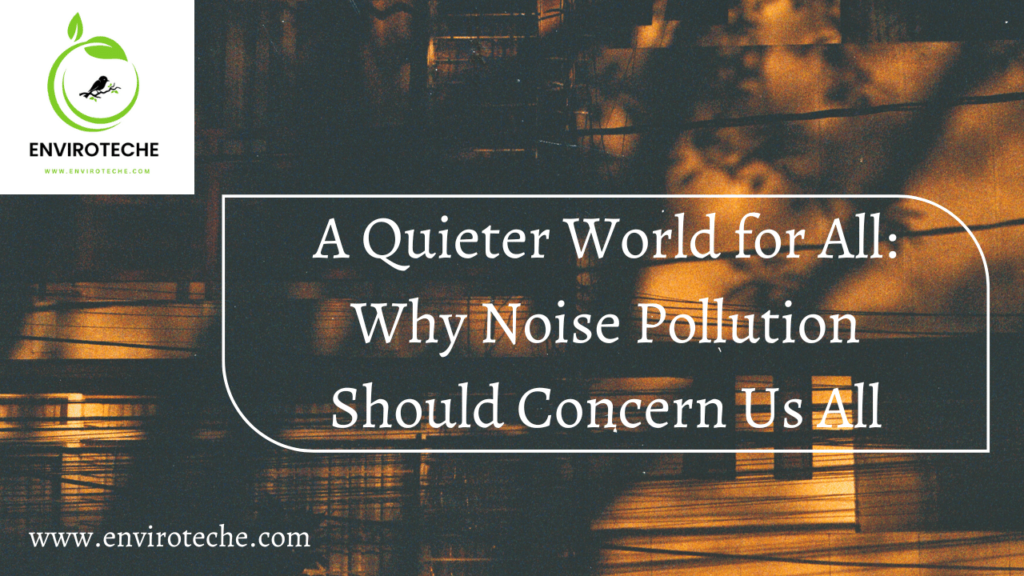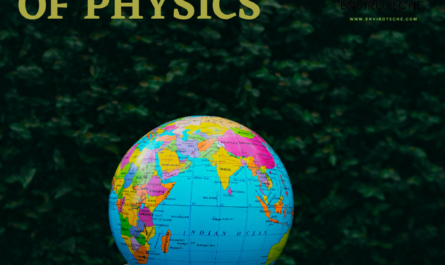Muhammad Qasim1, Qudrat Ullah1
1Department of Environmental Sciences, Government college university Faisalabad

Introduction:
Many individuals throughout the world are becoming increasingly concerned about noise pollution. It is described as any undesired or excessive sound that could harm the environment or people’s health. Transportation, industrial processes, and leisure pursuits are just a few of the sources of noise pollution. Significant negative effects of noise pollution on human health include cardiovascular illness, hearing loss, stress, anxiety, and sleep disturbances.
Additionally, noise pollution can harm wildlife by destroying habitat and interfering with communication. It is essential to talk about noise pollution and how it affects both people and the environment. To lessen noise pollution and safeguard both human health and the environment, it is crucial to raise awareness of this problem and consider potential remedies.
Effects of noise pollution:
Noise pollution has a tremendous impact on the environment and on people’s health. High noise levels can affect humans negatively by causing stress, anxiety, sleep disturbances, hearing loss, and cardiovascular disease. Chronic noise exposure has also been associated with the emergence of mental health conditions like dementia and depression. Noise pollution has serious negative consequences on the environment, especially on wildlife, in addition to its negative effects on human health.
For instance, a species’ ability to communicate can be seriously hampered by excessive noise, especially if that species depends on vocal communication. Furthermore, because animals may be compelled to leave their native habitats in order to escape the disturbance, noise pollution can result in habitat damage. Food chains may be upset, and natural system imbalances may result as a result, with cascading consequences on entire ecosystems. Overall, noise pollution is a major problem with significant implications for both human health and the environment.
Sources of noise pollution:
Noise pollution is a widespread issue that has an impact on individuals in a variety of contexts, and it is caused by a number of different causes. Transportation, including trains, planes, and automobiles, is one of the most prominent contributors of noise pollution. These modes of transportation can generate excessive noise, particularly during takeoff, landing, and acceleration, which can impair sleep, lead to hearing loss, and result in other health issues.
Industrial noise from places like factories and building sites, which can generate a lot of noise from tools, equipment, and machinery, is another significant cause of noise pollution. This kind of noise pollution can damage nearby wildlife’s habitats and interfere with their ability to communicate, as well as cause hearing loss, tinnitus, and other health issues. Finally, noise pollution can also be greatly impacted by recreational noise, such as that produced by loud clubs, sporting events, and music festivals.
In particular, those who are exposed to this kind of noise pollution for an extended period of time may have hearing loss, sleep disturbances, stress, and anxiety as a result. In general, these noise pollution sources are numerous, and it is crucial to address them in order to lessen their detrimental effects on both human health and the environment.
Regulations and Solution:
NP is a severe problem that has an impact on both human and animal health and welfare. Different countries and locations have different laws in place regarding noise pollution. The amount of noise that can be produced by sources including cars, industrial facilities, and recreational activities is regulated by legislation in various nations.
The purpose of these laws is to safeguard citizens from the negative consequences of np. However, it may be challenging and inconsistent to enforce these laws. The use of sound barriers, which can effectively reduce the amount of noise that reaches neighboring residents, is one option for minimising noise pollution. To lessen the noise that passengers hear, noise-cancelling equipment can also be employed in places like cars and aero planes.
Increased enforcement of current laws can also aid in the reduction of np. By utilising earplugs and lowering the intensity of their music, people can take efforts to lower their personal noise levels thanks to education and awareness campaigns. To build a world that is quieter for everyone, it is crucial for governments, businesses, and individuals to collaborate.
The role of individuals:
To reduce np, people must play a significant role. One easy step people can take is to turn down the volume on their music and other loudspeakers, televisions, speakers, and headphones. By doing this, you may dramatically lower the noise levels in your house and around town. Additionally, noise-cancelling headphones or earplugs can assist lessen exposure to loud noises in a variety of environments, including concerts or construction sites.
Supporting programmes to reduce noise pollution, including those that push for stronger restrictions on noise levels in public areas, fund research into noise-reducing technologies, and promote the use of electric vehicles, can also have a big influence. Individuals can contribute to making the world more peaceful and conducive to everyone’s health and wellbeing by doing these things.
Conclusion:
In conclusion, it is impossible to ignore how np affects both the environment and human health. According to research, chronic exposure to noise pollution can cause a number of health issues, including as stress, anxiety, insomnia, hearing loss, and cardiovascular disease. It may also harm wildlife, disrupting their ability to communicate and destroying their habitat. People must therefore take initiative and support programmes that attempt to reduce noise pollution.
This includes using earplugs, turning down the music volume, and supporting laws and other NP reduction strategies. Together, we can make the world more peaceful for everyone, which will be good for both the environment and our health. To ensure a healthier and happier future for ourselves and future generations, it is our duty to take action and support noise reduction measures.
Check Other Schlorships:


